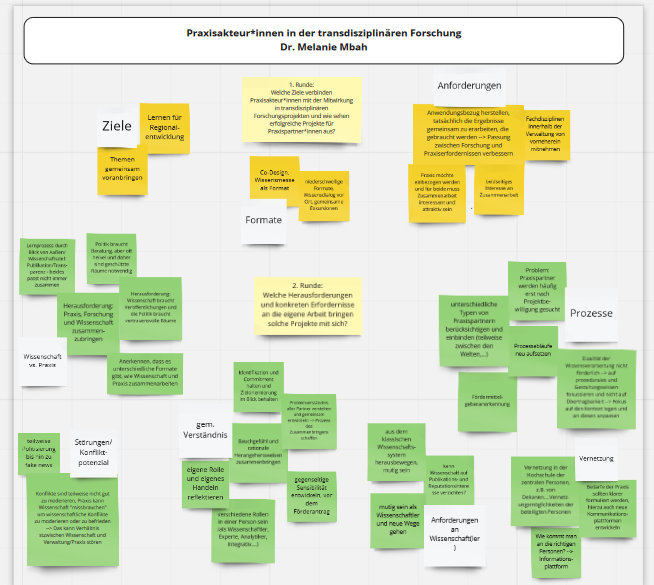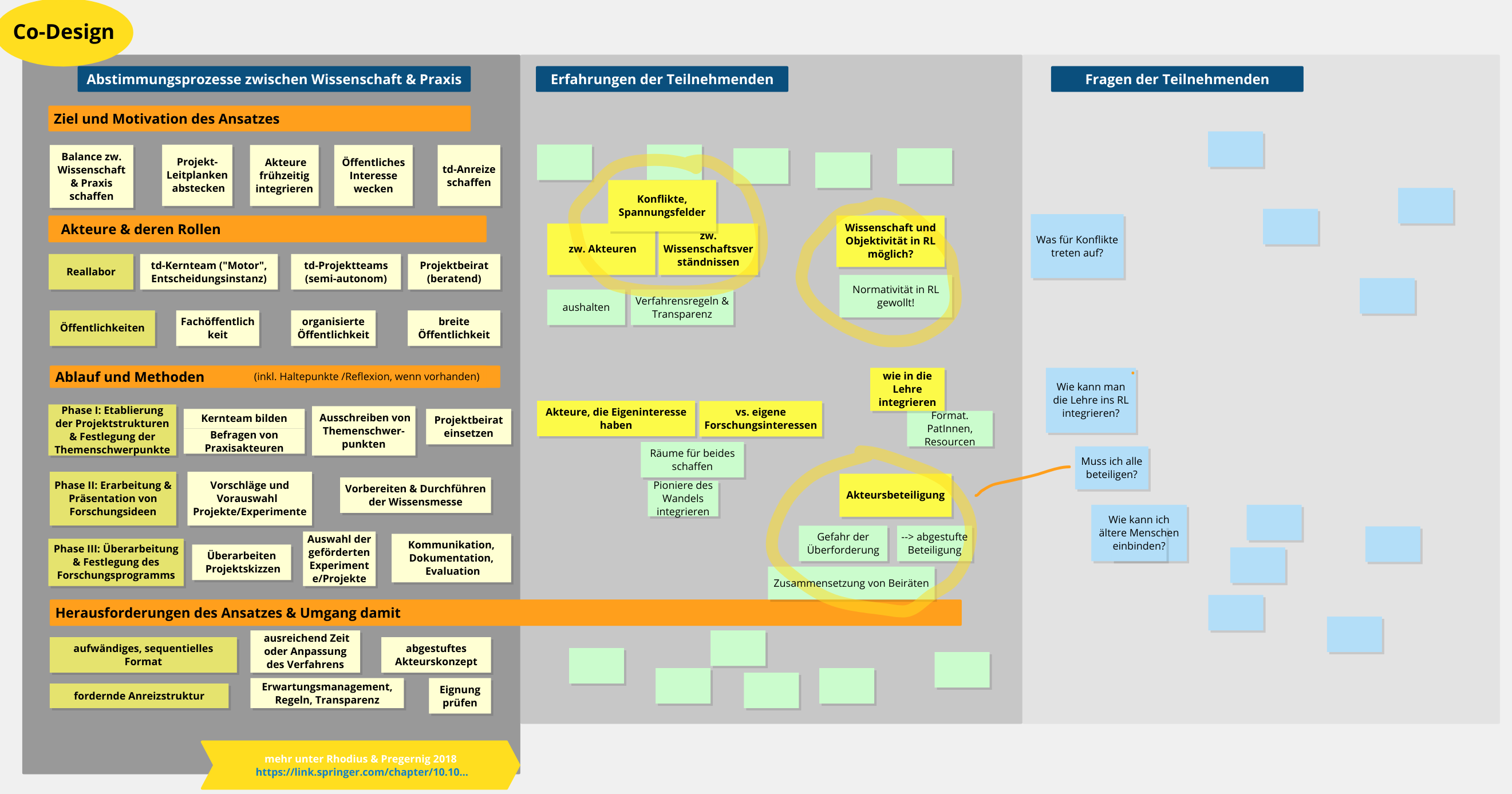On March 18 and July 23, 2021, tdAcademy topic line 4 "New formats" held a dialogue forum for scientists and practitioners with different methodological approaches. This short report summarizes the process and results of the workshops.
The first of these dialogue forums was organised - together with ISOE, the Darmstadt University of Applied Sciences h_da and the Schader Foundation Darmstadt - as part of the “Darmstadt Days of Transformation” for practitioners in transdisciplinary research. Practice partners, especially with a municipal background from administration, companies and initiatives, presented their respective formats in transdisciplinary cooperation and discussed their experiences, perspectives and challenges.
One focus of the discussion in the working groups along selected fields of action in urban development (housing, mobility, energy) dealt with the development of common problems and goals between practice and science. It was also asked which goals practitioners associate with the participation in transdisciplinary research projects and how they would define success for themselves. The goals include, for example, being able to try out the formats, bring about better and more well-founded decisions, develop more suitable solutions and enable joint learning. The practitioners reported from a real laboratory perspective or with transment experience which challenges and specific requirements for their own work are associated with the integration into a research project and the choice of a certain format. The difficulty in assigning roles was also pointed out here: As a practice partner, you often have a scientific view of the situation and the supposedly clear separation of 'science here, practice there' does not exist in real project life.
Conflicts of objectives and how to deal with them were also discussed by various practitioners. For example, role conflicts between science and practice can arise due to different expectations and self-conceptions. While practitioners may expect legitimacy for a certain solution, this may be opposed by the scientific understanding of neutral and objective support. However, there was agreement across the working groups and project formats that expectations must always be pointed out in order to make them tangible and solvable. In contrast, the role of researchers was discussed very controversially. On the one hand, researchers see themselves as advisors and informers, and on the other hand, researchers are seen by practitioners as stakeholders. Researchers would have to change roles more frequently in the course of the research process and deal with very different demands from outside (politics, partners, administrative environment) and inside (project dynamics). Timing and the context of the project also played a role here.

Goals and challenges of practitioners in transdisciplinary research - exemplary results of group work (Schader Stiftung 17.3.2021)
The second dialogue forum, which was also held online on 23 July 2021 with 50 participants, took place in cooperation with the "Netzwerk Reallabore für Nachhaltigkeit". The dialogue forum "The real-world laboratory - one format, many approaches?" compared four different approaches to real-world laboratories and discussed them against the background of the respective focus of the three phases co-design, co-production (collaboration) and co-evaluation.
In the process, the different political levels and fields of action were also looked at and differences were discussed, for example between regional sustainability transformations and transformations through technical innovations. In addition to content-related aspects, structural differences along a common analysis scheme were elaborated and the concrete design of these approaches and their respective chosen methodological steps could be compared.
In addition to the questions about the possible attribution of effects of different real-world laboratory approaches with regard to a sustainability transformation and the transparent handling of this in the co-evaluation phase, all projects in the co-design phase asked themselves the question about the common understanding of the problem and the goal. The co-evaluation phase was introduced in Wuppertal with its own evaluation model for city-making (Wanner & Augenstein 2021). The regional real-world laboratory Wissensdialog Nordschwarzwald showed new methodological paths with regard to co-design with a knowledge fair and various dialogue formats (Rhodius & Pregernig 2018). The prototyping approach pursued by the European network SISCODE through ten different pilot projects for the development of product and system innovations started with participatory co-design in a successful co-creation, the results of which are to be rolled out in the next step within and outside the network (Schmittinger 2021). Common to all approaches was also the question posed by the hybrid DELTA project to support the energy transition in Darmstadt: How can the binding involvement and motivation of stakeholders succeed if they are not direct practical partners in a real-world laboratory project? The implementation of an energy academy is one approach to achieve this integration through various formats (summer schools, UrbanUtopiaLAB, etc.) (West 2021).

Experiences on coordination processes between science and practice - exemplary results of group work (see Brohmann, Mbah, Kelly (2021): Workshop "Das Reallabor - ein Format, viele Ansätze?!")
Brief documentation documents are already available for both dialogue forums (in German only):
Dialogforum 1: Workshop-Dokumentation des Online-Workshops vom 17. März 2021. Schader Stiftung
Dialogforum 2: Dokumentation des Online-Workshops am 23. Juli 2021. Öko-Institut e.V.
Sources:
Rhodius, R./Pregernig, M. (2018): Per 'Wissensmesse' zum Forschungsprogramm: Arbeitsphasen und Abstimmungsprozesse zwischen Wissenschaft und Praxis. In: Defila, Rico & Di Giulio, Antonietta (Hg.) Transdisziplinär und transformativ forschen: Eine Methodensammlung. Wiesbaden: Springer. 163-194.
Schmittinger, F./ Mariani, I./ Deserti, A./ Rizzo, F. (2021): SISCODE – Co-Design for Society in Innovation and Science. https://siscodeproject.eu/wp-content/uploads/2021/05/D5.2_Interactive_Guidebook.pdf
Wanner, M. (2021): Wirkungsbedingungen des koproduktiven Stadtmachens in Wuppertal. Vortrag; Online-Workshop „Das Reallabor – ein Format, viele Ansätze?!“; 23.07.2021; Online.
West, C. (2021): DELTA – Reallabor hybrid: Next Generation (?!). Vortrag; Online-Workshop „Das Reallabor – ein Format, viele Ansätze?!“; 23.07.2021; Online.
